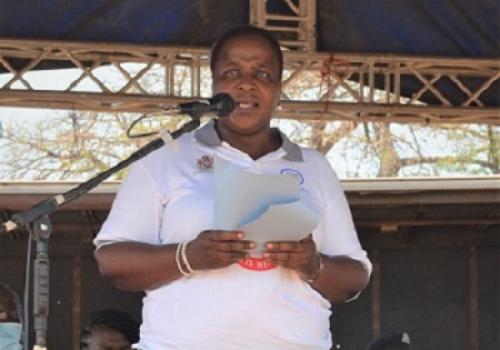The commemoration of this year's Southern African Development Community (SADC) Malaria Day should provide an opportunity to celebrate the progress made in controlling the disease, emphasising on preventive measures and mobilising the communities for ownership of interventions and actions to end malaria.
The commemoration of the day should also provide an opportunity to renew regional commitments and efforts to eliminate this deadly disease, Honourable Khumbize Kandodo Chiponda, Minister of Health of the Republic of Malawi has said.
Minister Chiponda said this during the commemoration of SADC Malaria Day hosted in Salima District on 11th November, 2021. She informed delegates that it is not possible to eliminate malaria unless the community is involved and that community ownership of interventions and their participation is therefore very key to sustained positive behaviour on malaria prevention.
She said no country in SADC should dream of eliminating malaria unilaterally because the borders remain porous, people easily cross borders for trade and family reasons, thus transmitting malaria parasites with them. She reiterated that infected mosquitoes do not respect borders as they freely fly across borders and bite people on the other side. Therefore, cross border collaboration remains key to malaria elimination in the Region.
Hon. Chiponda underscored that malaria remains a huge public health problem in the Region and this has taken a heavy toll on the health systems, weakening productivity of citizens and reducing economic growth at both household and national level, a predicament she described as a cause of economic stagnation in the Region, and above all causing loss of life.
SADC Executive Secretary His Excellency Mr Elias Mpedi Magosi commended Member States who have launched the "Zero Malaria Starts With Me campaign" to mobilise and empower communities to take ownership of the fight to end malaria and to accelerate malaria prevention and treatment and save lives. He applauded those who have established National End Malaria Funds to mobilise additional resources from the private sector and other sectors to complement the available resources in the fight against malaria.
H.E Magosi said the Region needs a strong surveillance and monitoring and evaluation system for effective malaria service delivery. He said through the Windhoek Declaration on elimination of malaria, Member States are expected to enforce accountability and achieve regional malaria elimination. He noted with delight that SADC Member States have adopted score cards for malaria control and elimination to track implementation and progress towards achieving the set targets.
World Health Organisation (WHO) representative Dr Janet Kayita hailed the long–awaited malaria vaccine as a breakthrough for science, child health and malaria control. She said the use of the vaccine in addition to existing tools to prevent malaria could save tens of thousands of young lives each year.
Dr Kayita highlighted that based on the results from the pilot exercise from three countries, lessons learnt over the last two years are that the vaccine can be delivered through child health clinics by Ministries of Health, and readily reach children at high coverage levels, community demand for the vaccine is strong, the vaccine is not only safe but significantly reduces life-threatening severe malaria and it is estimated that the vaccine is highly cost-effective.
The theme for this year's commemoration for SADC Malaria Day is "Community involvement is key to achieving zero Malaria", with a slogan "together we can defeat malaria".
Commemoration of SADC Malaria Day is held annually on 6th November to create awareness about malaria and mobilise communities to participate in the malaria control programmes. The communities are mobilised through health education to create awareness and are taught to recognise signs and symptoms of malaria to seek immediate treatment when feeling sick, empower communities on home-based treatment and to capacitate communities on the use of personal protective measures to mitigate against the spread of malaria.

